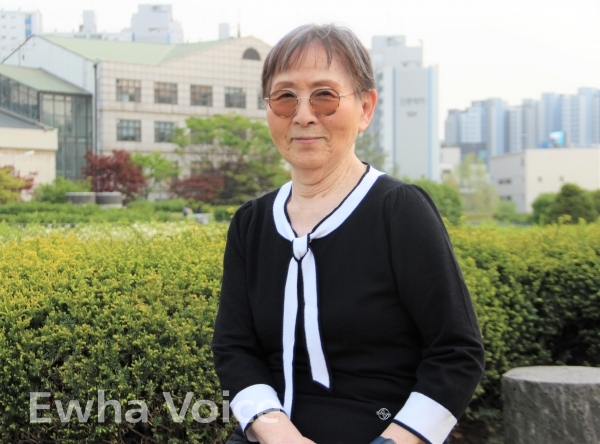
Since its founding in 1886, Ewha Womans University has nurtured many graduates, Chum Sook Yoo being one of the earlier alumna.
Chum Sook Yoo, an Ewha alumna from the Department of Sociology, recently revisited the campus 60 years after her graduation in 1963. She shared her experience being back at campus.
“It felt like I was in a different world,” said Yoo upon entering the school campus. “Ewha has changed so much, for the better.”
Delighted to see young students roaming around the campus, Yoo reminisced about her time at Ewha. The first thing she noted was how the fashion of Ewha students had changed compared to the 1960s. Yoo commented that Ewha students, including herself, always wore medium heels. She recalled the tip-tap noises from the heels that could be heard just about anywhere on campus. Straight pencil knee-high skirts were also a common sight as pants for women were not yet a fashion trend at the time.
According to Yoo, Ewha never enforced any fashion standards on its students. At Ewha, students were encouraged to freely wear what they wanted to express their individuality and autonomy, both of which are Ewha’s central values. However, there were social standards about appropriate outfits from time to time that greatly limited students’ choices of outfit. Upon seeing the majority of Ewha students wearing sneakers, Yoo expressed her joy that students are wearing much more comfortable and practical outfits, enjoying more freedom in fashion without harsh backlash from the society.
The school’s landscape and culture have also developed drastically in the eyes of Yoo. According to Ewha History, the Student Union and dormitories were built to accommodate more students both for academics and relaxation during the 1960s. As Yoo toured the campus, she mentioned that she could not recognize any of the surrounding landscape because of how campus buildings such as Ewha Campus Complex had changed the view so much. She was only able to match the Welch-Ryang Auditorium and Administration Hall with her prior image of Ewha.
Growing up, Yoo experienced the major historical events of South Korea such as the division of the South and North and the Korean War. She had to live as a refugee on some occasions, splitting a single apple as a meal between seven siblings. The turbulent times had shaped her childhood without giving her much room to contemplate issues other than survival.
However, Yoo emphasized that it was due to Ewha’s Christian values and culture that she was able to become interested in women’s social status. Before attending Ewha, she was neither aware about the possibility for a change of social status nor invested in sociology deeply.
Gradually, through religious experiences and classes at school, Yoo studied and researched how the Methodist church and female missionaries such as the school’s founder, Mary F. Scranton, had helped Korean women to achieve education and gender equality. That knowledge led to her interest in family and women’s policies and her passion for writing academic papers about how Christianity aided the development of Korean women’s status and rights that were published in academic journals.
After graduation, Yoo’s primary goal was to lead a self-reliant life by securing a job which contrasted with the society’s assumption that women her age would prioritize marriage. She worked as a Korean education assistant at the Korean Embassy at Washington D.C. and currently resides with her family in the United States.
Regarding her personal life coping with mental difficulties, Yoo voiced that in her days at Ewha, students were too occupied by sheer survival due to war times and harsh social realities like the April 19 Revolution and the May 16 Military Coup d’etat.
“There were indeed times when I felt sad,” Yoo said. “Strangely enough, I simply focused on moving forward, and looking back, it turned out I had endured the hard times.”
Even today, being a college student still presents many difficulties, one representative case being depression. Due to academic and personal worries such as exam scores, financial difficulties, concerns about the future or having no dreams, students sometimes feel like they are wasting time or going the wrong way.
Yoo empathized with current students’ hardships and presented her support for each Ewha student’s way of living as a senior of both Ewha and life.
“I hope you know that nothing is ever wrong or too late,” Yoo remarked. “It is a simple matter of difference, so just do what you wish to.”

